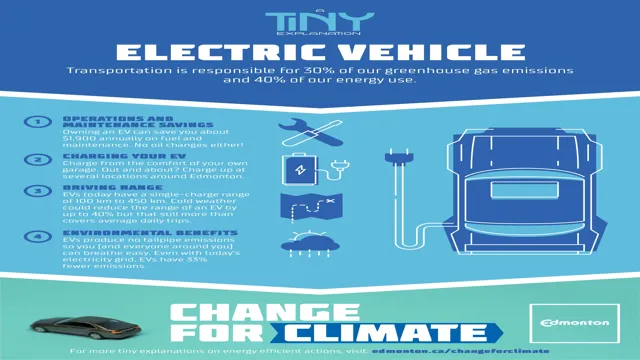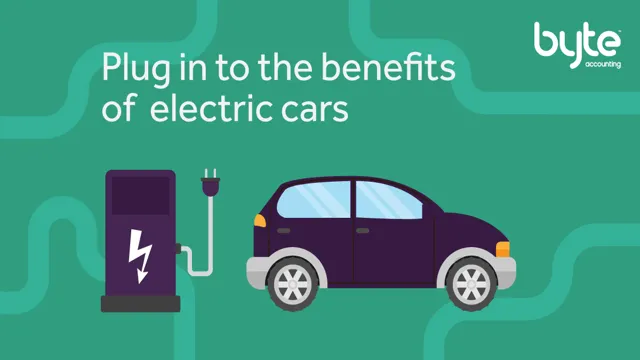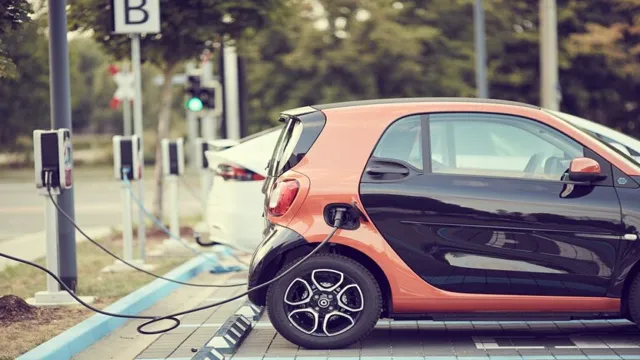10 Ways Electric Cars Benefit the Environment for a Greener Future
Electric cars have recently gained popularity as a climate-friendly alternative to traditional gasoline-powered vehicles. With their impressive performance and minimal carbon footprint, they seem like the ideal solution to reducing our impact on the environment. But the question remains: what is the actual environmental impact of electric cars? While it’s true that electric cars emit significantly less pollution than their gas-guzzling counterparts, their environmental impact is not entirely straightforward.
For starters, the production of electric vehicles requires a considerable amount of energy and resources, such as rare earth metals and lithium batteries. These materials need to be mined and processed, which can be environmentally damaging. Furthermore, the electricity used to power these vehicles is not always generated from renewable sources.
In fact, in some cases, it may come from non-renewable sources like coal or natural gas, which can still contribute to greenhouse gas emissions. Despite these factors, electric cars are still generally considered to be a more environmentally friendly option than traditional cars. On average, electric vehicles produce less carbon emissions over their lifetime than gasoline-powered cars.
Moreover, as more renewable energy sources become available, the environmental impact of electric cars will only continue to decrease. All in all, while electric cars are not a perfect solution, they are an important step in the right direction towards reducing our impact on the environment. As we continue to improve the sustainability of electric vehicles and increase the use of renewable energy sources, we can look forward to a cleaner, greener future on the roads.
Reduced Carbon Emissions
When it comes to environmental benefits, electric cars are a great option. One major reason is the reduced carbon emissions. Traditional vehicles that run on gasoline emit harmful pollutants into the air that contribute to global warming and climate change.
Electric cars, on the other hand, emit little to no pollutants because they run on electricity. Even if the electricity used to charge them comes from less sustainable sources such as coal-fired power plants, electric cars still have a much lower carbon footprint than gasoline-powered vehicles. So, if you’re concerned about the environment and want to make a positive impact, switching to an electric car is definitely worth considering.
Plus, not only will you be doing your part to help the planet, but you’ll also save money in the long run with lower fuel costs and maintenance fees. So why not make the switch?
Electric Cars Produce Zero Emissions
Electric cars are becoming increasingly popular due to their reduced carbon emissions compared to traditional gasoline-powered vehicles. By using electric motors instead of internal combustion engines, electric cars produce zero emissions at the tailpipe. This means that they do not release harmful pollutants, such as carbon dioxide and nitrogen oxides, into the air.
As a result, they help to reduce our carbon footprint and improve air quality. Furthermore, advances in renewable energy sources mean that electric cars can be powered using clean, renewable energy, such as solar or wind power. While there are still challenges to overcome, such as the limited range of some electric cars and the need for more widespread charging infrastructure, the benefits of electric cars in terms of reduced emissions and environmental sustainability are clear.
As we continue to work towards a cleaner, more sustainable future, electric cars will undoubtedly play a key role in reducing our impact on the environment.

Conventional Cars Produce High Levels of CO2
Conventional cars have long been known to produce high levels of carbon emissions, particularly carbon dioxide (CO2), which is a significant contributor to global climate change. With the world slowly but surely shifting towards a more sustainable and eco-friendly approach, reducing carbon emissions has become a top priority. This has prompted the development of alternative forms of transportation, including electric and hybrid vehicles, which emit significantly less CO2 than their gas-powered counterparts.
By transitioning to these cleaner modes of transportation, we can reduce our carbon footprint and contribute to a cleaner, healthier planet. So why not make the switch to an electric or hybrid vehicle today and do your part in reducing carbon emissions?
Electric Cars Use Renewable Energy
Electric cars are not only sleek and futuristic but also offer a compelling solution to reducing carbon emissions. As the world continues to search for ways to keep global warming in check, increasing our dependence on renewable energy sources like solar and wind energy makes electric cars an excellent alternative. Unlike gas cars, electric vehicles derive their energy from rechargeable batteries that draw energy from an electrical source rather than fossil fuels.
This is the main reason why electric cars are so environmentally friendly as they produce zero emissions even when driven. By adopting electric cars, we can significantly reduce our carbon footprint, safeguard our natural resources, and protect our environment while still enjoying a highly efficient form of transportation that is as convenient as it is cost-effective.
Efficient Use of Resources
Electric cars have become increasingly popular over the years due to their environmental benefits. Besides being emission-free, these cars also have a potential to use resources efficiently. The regenerative braking system in electric cars provides the ability to recover energy that would otherwise be lost during deceleration.
This energy can then be used to recharge the battery, reducing the load on the electric grid. Additionally, electric cars have fewer moving parts than gasoline-powered vehicles, reducing the amount of maintenance and resources required for upkeep. The batteries in electric cars can also be recycled, creating a closed-loop system where materials are reused rather than discarded.
Overall, these the environmental benefits to electric cars are impressive, making them an attractive option to modern-day drivers.
Electric Cars Use Fewer Resources During Production
One of the most significant advantages of electric cars over traditional gasoline-powered vehicles is the efficient use of resources during production. Electric vehicles require fewer resources to manufacture because they have fewer complex components and don’t require as much lubrication or oil changes. Additionally, electric motors are much simpler and more efficient than gasoline engines, which means less energy is wasted during their production.
This means fewer emissions and a more efficient use of natural resources. Overall, electric cars are a greener, more sustainable alternative to traditional vehicles and will play an essential role in reducing our carbon footprint and protecting the environment. While electric vehicle production is still in the early stages, it is exciting to see how quickly and widely it is being adopted by automakers and consumers alike.
Batteries Can Be Recycled and Repurposed
Battery recycling and repurposing play a crucial role in the efficient use of resources. When we dispose of used batteries, we not only waste valuable resources but also harm the environment. Fortunately, the recycling and repurposing of batteries can prevent this waste and reduce their impact on the environment.
The process involves collecting used batteries, disassembling them, and separating the components that can be used again. The recovered materials can then be used to make new batteries, electronic devices, and even jewelry. The good news is that this process contributes to the circular economy, where resources are reused, and less waste is generated.
So, the next time you replace your batteries, consider recycling or repurposing them instead of throwing them away. By recycling and repurposing batteries, we can minimize our dependency on raw materials and reduce the risk of environmental pollution. Additionally, this approach can save valuable energy that would otherwise be needed to mine, refine, and transport new raw materials.
In fact, recycling batteries can save up to 95% of the energy used to manufacture them. Moreover, repurposing batteries can be a source of innovation, as these batteries can be used in a variety of ways, such as to power remote sensors or to store renewable energy. For instance, repurposed batteries can store the excess energy from solar panels during the day and release it during the night when the demand is high.
In conclusion, battery recycling and repurposing are essential practices that can help us use our resources efficiently. Not only does this contribute to the sustainability of the planet, but it also reduces the cost of new products, improves energy efficiency, and fosters innovation. Therefore, we should all do our part by participating in battery recycling programs and considering the ways we can repurpose our old batteries.
Together, we can make a significant impact on the environment and the world’s resources.
Reduced Air Pollution
Electric cars are becoming increasingly popular due to their environmental benefits, with reduced air pollution being one of the biggest advantages. Traditional gasoline vehicles emit harmful pollutants such as carbon monoxide, nitrogen oxides, and particulate matter, which can have serious health consequences for humans and the environment. Electric cars, on the other hand, produce zero emissions, reducing air pollution significantly.
Not only does this lower the chances of respiratory illnesses and cardiovascular disease, but it also helps to combat climate change. In fact, according to an analysis by the Union of Concerned Scientists, electric cars produce fewer emissions per mile even when the electricity used to power them comes from fossil fuels. This makes them a greener and more sustainable solution for our transportation needs.
As more people switch to electric cars, the benefits to the environment and public health will only continue to grow.
Electric Cars Do Not Emit Harmful Gases
One of the most significant benefits of electric cars is that they don’t emit harmful gases, which reduces air pollution. Electric cars run on electricity stored in batteries, which eliminates the need for gas and diesel fuel. Vehicles powered by gasoline and diesel engines emit carbon dioxide, nitrogen oxides, and other harmful pollutants into the air, contributing to climate change, aquatic acidification, and respiratory problems.
However, electric cars produce far fewer emissions than gas-powered cars, making them an excellent choice for eco-conscious individuals who wish to reduce their carbon footprint. Plus, the electricity used to power electric cars can come from renewable sources like solar, wind, and hydro power, which further reduces emissions. So, by driving an electric car, you’re not just contributing to a greener planet, but you’re also helping to improve air quality and protect the environment.
Lower Levels of Pollution Can Improve Public Health
Reduced air pollution can have a significant impact on public health. By limiting the amount of harmful substances released into the air, we can breathe more easily, and our bodies don’t have to work as hard to filter out toxins. This can result in a reduction in respiratory and cardiovascular illnesses, as well as other health problems caused by exposure to pollution.
For example, studies have shown that reducing air pollution levels in major cities can lead to a lower incidence of asthma attacks and respiratory issues. Additionally, lower pollution levels can lead to better overall health outcomes and improve life expectancy. It is crucial that we continue to work towards reducing air pollution so that we can all breathe cleaner air and enjoy better health.
By doing so, we can create a healthier and more sustainable future for generations to come.
Saving Energy and Resources
Electric cars have many environmental benefits compared to traditional gas-powered vehicles. Firstly, electric cars do not emit harmful pollutants into the air, helping to reduce air pollution levels. They also produce less noise pollution, making cities quieter and more pleasant places to live.
Secondly, electric cars are much more energy-efficient than traditional gas-powered cars. According to studies, they use less than half the energy of gas-powered cars to travel the same distance. Finally, electric cars also help to reduce our dependence on fossil fuels and contribute to a more sustainable future.
By relying on renewable sources of energy, we can reduce our carbon footprint and help to fight climate change. Overall, purchasing an electric car is an important step towards saving energy and resources, and the long-term environmental benefits are worth considering.
Electricity Generation Is More Efficient Than Gasoline Production
Electricity generation is indeed much more efficient than gasoline production. The process of generating electricity is simple and straightforward. It involves the conversion of energy from one form to another using turbines and generators.
The energy source could be a variety of things such as wind, solar, hydro, or even nuclear. On the other hand, gasoline production is a complex process that involves several stages of refinement and transportation. Crude oil, the primary source of gasoline, is pumped from deep under the ground and then transported to oil refineries where it is chemically processed, refined, and blended.
The gasoline is then transported to gas stations and distributed to customers. The process of gasoline production consumes a lot of resources and energy, from drilling to refining and transportation. On average, for every 1 barrel of crude oil that is extracted, around 15-20% of it is used just to power the machinery and equipment during extraction and transportation.
This means that before gasoline is even produced, a significant amount of energy and resources are consumed just to get the crude oil out of the ground. In contrast, electricity can be generated from renewable sources such as solar and wind, which require minimal or no resources at all, and produce no harmful emissions. Furthermore, electricity generated from renewable sources is becoming cheaper and more accessible as technology advances.
In conclusion, while gasoline production has been the primary source of fuel for transportation for decades, it is an inefficient process that consumes a lot of resources and energy. Electricity generation, on the other hand, is a more efficient and cleaner source of energy. By adopting renewable sources of energy for electricity generation, we can save valuable resources, reduce emissions, and create a more sustainable future for generations to come.
Conclusion
In a world where we struggle to balance our needs and wants with the impact we have on the environment, electric cars offer a glimmer of hope for a cleaner, greener future. With their energy efficiency, lack of emissions, and the ability to utilize renewable energy sources, electric cars provide obvious and substantial environmental benefits. So let us all take the wheel of these electric wonders and drive towards a sustainable future, because at the end of the day, taking care of the planet is always the electric choice!”
FAQs
What are some environmental benefits to using electric cars?
Electric cars produce zero emissions which helps reduce air pollution and greenhouse gas emissions, contributing to a cleaner environment. They also help reduce noise pollution as electric motors are much quieter than traditional gasoline engines.
How do electric cars help reduce our carbon footprint?
Electric cars have significantly lower greenhouse gas emissions compared to traditional gasoline cars, which emit harmful pollutants into the atmosphere. By driving an electric car instead of gasoline, we can reduce our carbon footprint and help fight climate change.
How does driving an electric car save money in the long run?
While electric cars may have a higher upfront cost, they are much cheaper to operate and maintain over the long run. Electric cars have lower fuel costs and require less maintenance due to fewer moving parts and less wear and tear on the engine.
Are there any government incentives for purchasing an electric car?
Yes, many governments offer incentives for purchasing an electric car such as tax credits or rebates. These incentives can help decrease the upfront cost and make electric cars more affordable for consumers.



